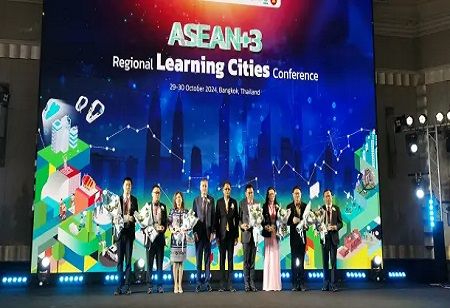The Asia Learning Cities conference that recently took place celebrated new UNESCO Learning Cities from China, Philippines, Thailand, and Vietnam. During this event held in Bangkok, lifelong learning was hailed as an important aspect of sustainable development in the ASEAN+3 Regional Learning Cities Conference. Soohyun Kim, Regional Director of UNESCO Bangkok, paid tribute to seven municipalities of these countries for their entry into UNESCO's Global Network of Learning Cities for 2024, bringing it to 356 cities across 79 nations.
Opening South-East Asia’s first regional conference on UNESCO Learning Cities in Bangkok, Ms Kim praised the new Learning Cities—Nanjing (China), Legazpi (the Philippines), Bangkok, Khon Kaen, and Yala (Thailand), and Ho Chi Minh City and Son La (Viet Nam)—for their ‘admirable commitment to making lifelong learning a reality for all their citizens.’ She added that these cities are ‘building pathways to knowledge, ensuring that learning takes place not only in classrooms but also in parks, streets, and homes.’
More than 250 policymakers, city officials, and education experts—including representatives from the seven newly designated UNESCO Learning Cities—gathered in Bangkok for the first-ever ASEAN+3 Regional Learning Cities Conference. Participants from ASEAN member countries as well as China, Japan, and the Republic of Korea emphasized the need for enhanced collaboration and knowledge sharing among Learning Cities to address the twin challenges of the climate emergency and a global learning crisis that has left over 8 million youth out of school in South-East Asia alone. They highlighted the importance of promoting equitable access to lifelong learning opportunities to support inclusive and resilient communities.
Prof. Supachai Pathumnakul, Permanent Secretary of Thailand’s Ministry of Higher Education, Science, Research and Innovation, said, 'We recognize that all [cities] have the potential to serve as learning platforms, where citizens of all ages can access knowledge and apply such knowledge to benefit themselves, their families, their communities, and their societies'.
The region that accommodates close to 700 million population is Southeast Asia, which is experiencing rapid urbanization and thus great issues such as climate change, natural disasters, and changes in social order owing to advancements in artificial intelligence. Raúl Valdés-Cotera, Chief Programme Coordinator at the UNESCO Institute for Lifelong Learning and Coordinator of the UNESCO Global Network of Learning Cities, said, "As urban areas expand, so do both challenges and opportunities. Lifelong learning is essential for realizing the potential of Southeast Asia's cities, where more than half of the region's population resides".
"We have to be informed about the changes to adjust and take advantage of them. It needs proper management of transformation to take advantage of the new opportunities", said Dr. Kitti Satjawattana, head of Thailand's Program Management Unit on Area-Based Development.

